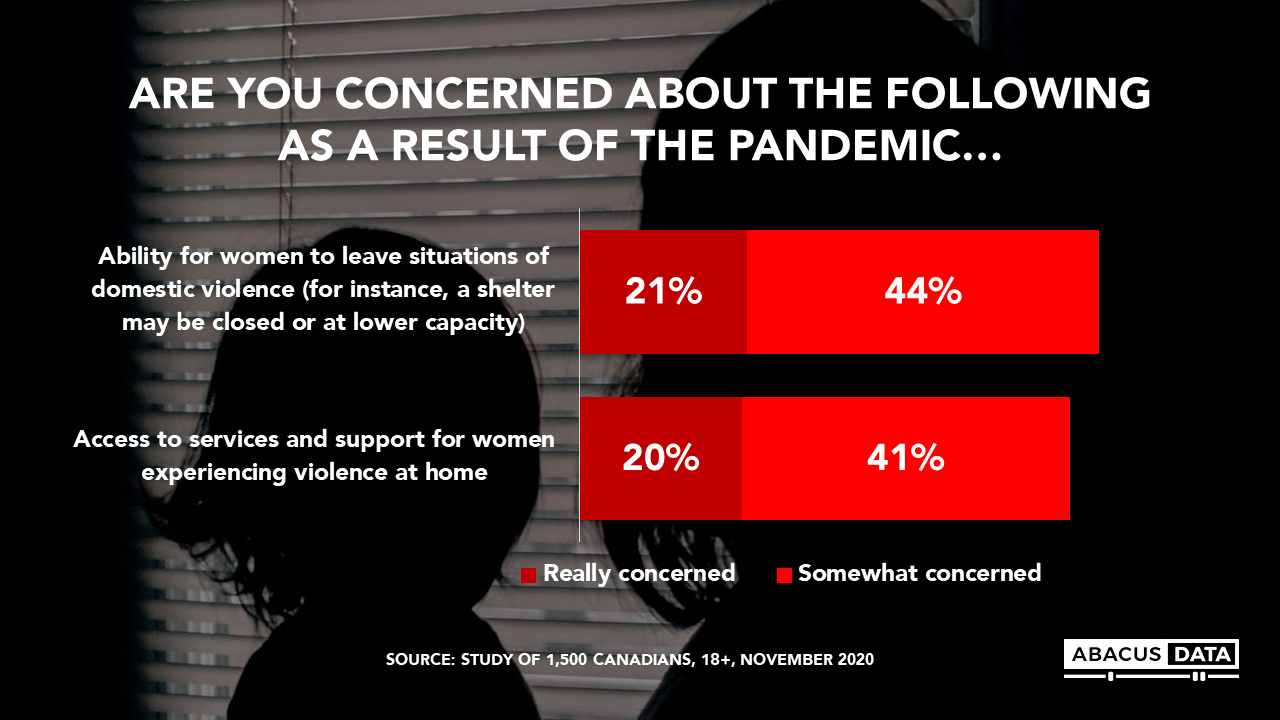International Day for the Elimination of Violence Against Women: Canadians Concerned about COVID-19 Impacts
November 26, 2020
Yesterday was the International Day for the Elimination of Violence against Women. It is a day to amplify the call to action of eliminating and preventing violence against women.
The issue of violence against women is a problem world-wide and also at home. According to data from a Statistics Canada survey, every 6 days a woman is killed by her intimate partner.
Given the serious consequences of this issue, supports are paramount for these women. Prior to the COVID-19 pandemic, on any given night over 6,000 women and children slept in shelters across Canada. And on any given night- 300 were turned away.
But like many social services, access to supports for domestic violence was shaken during the pandemic. As another set of lockdowns roll around these difficulties seem here to stay- at least for the time being.
On our last omnibus survey, we wanted to gauge impressions about the difficulties in accessing these services, and the actions Canadians want to see as a result.
Here is what we found:
Canadians are concerned about the ability of women facing domestic abuse to leave their abusive situation and access supports and services they need.
65% of Canadians are concerned about womens’ ability to leave situations of domestic violence during the pandemic. And 61% are concerned about the access these women have to services and supports.

Level of concern does vary by demographics. For example, women are ten points more likely than men to be concerned about these issues. Those is rural Canada (where services are likely already sparse) are also more concerned than those in urban areas. And among women, those under 30 and over 60 are most concerned about the ability for women to leave situations of domestic violence.
Canadians think that the COVID-19 recovery from the federal government should recognize the decline in services during the pandemic and work to eliminate a gap in services, as much as possible.
Aside from asking Canadians whether or not this was an issue, we also asked what kind of solutions they want to see going forward. A near majority of Canadians want the government to take into account the deficit of support services for women experiencing violence during the pandemic. 90% say Canada’s federal COVID-19 recovery plan needs to account for this.

Politically, this aspect of a COVID-19 recovery plan has wide-spread support. 95% of Liberal voters say Canada’s COVID-19 recovery plan needs to take this into account. 83% of Conservative voters and 92% of NDP voters say the same.
There is also wide-spread support for Canada’s recovery to be gender-inclusive and include a gender-based analysis.
Concerns about the pandemic’s impact on violence against women is just one piece of a wider recognition of the disproportionate impacts of the pandemic on women (disproportionate labour force impacts, caregiving responsibilities, and risks of exposure just to name a few). Overall, 72% of Canadian’s say Canada’s COVID-19 recovery plan should be gender-inclusive and include a gender-based analysis.

Once again, support is strongest among Liberal voters (at 80%), but is also supported by the majority of Conservative (67%) and NDP (79%) voters.
SO WHAT?
While we’ve all felt the impacts of the pandemic in one way or another, the majority of Canadians are highly concerned for others living in more precarious situations. This includes women in situations of domestic violence who are likely facing even greater struggles. The isolation we feel from staying at home can be challenging for us all, but is particularly difficult for those who’s home is not safe.
Support services and shelters were vital pre-pandemic, and it is likely that home isolation and service interruptions during the pandemic will only make them more crucial for these women. Canadians recognize these challenges, and want the government to acknowledge them too.
ABOUT ABACUS DATA
We are the only research and strategy firm that helps organizations respond to the disruptive risks and opportunities in a world where demographics and technology are changing more quickly than ever.
Find out more about what we are doing to help clients respond to the COVID-19 pandemic.
We are an innovative, fast-growing public opinion and marketing research consultancy. We use the latest technology, sound science, and deep experience to generate top-flight research-based advice to our clients. We offer global research capacity with a strong focus on customer service, attention to detail and exceptional value.
We were one of the most accurate pollsters conducting research during the 2019 Canadian Election.

Contact us with any questions.
Find out more about how we can help your organization by downloading our corporate profile and service offering.
METHODOLOGY
The survey was conducted with 1,500 Canadians between the dates of November 13th and 17th, 2020. A random sample of panelists were invited to complete the survey from a set of partner panels based on the Lucid exchange platform. These partners are typically double opt-in survey panels, blended to manage out potential skews in the data from a single source.
The margin of error for a comparable probability-based random sample of the same size is +/- 2.51, 19 times out of 20.
The data were weighted according to census data to ensure that the sample matched Canada’s population according to age, gender, educational attainment, and region. Totals may not add up to 100 due to rounding.



